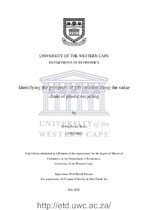Identifying the prospects of job creation along the value chain of plastic recycling
Abstract
South Africa is faced with a triple threat of poor economic growth, poverty and unemployment. Concurrently, the production of waste is increasing predominantly among urban areas. If catered for, the informal recycling sector has the potential to create a notable amount of opportunities for improving livelihoods and generating jobs. Street Waste Pickers (SWPs) are identified as individuals who collect recyclable waste material from households or industrial firms with the aim of selling them to recycling firms. This study aims to identify the barriers and challenges for job creation along the value chain of plastic recycling that SWPs face in the urban regions of Cape Town. In the absence of national database on the informal recycling sector, this study utilises primary data collection methods in the form of semi-structured interviews and questionnaires.
The findings in this study indicate that the informal recycling economy is predominantly male-dominated. This is particularly due to the labour-intensive nature of the activities in this sector. Furthermore, the informal recycling economy possesses little to no barriers of entry. This is substantiated by the slight difference found in the comparison of earnings by race, age and educational attainment. These results reveal that initiatives to absorb these individuals could potentially curb the large amount of unskilled unemployed citizens of South Africa and simultaneously help decrease the level of unemployment in the country.

